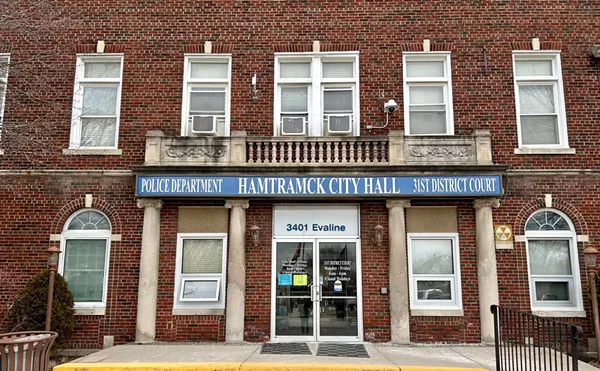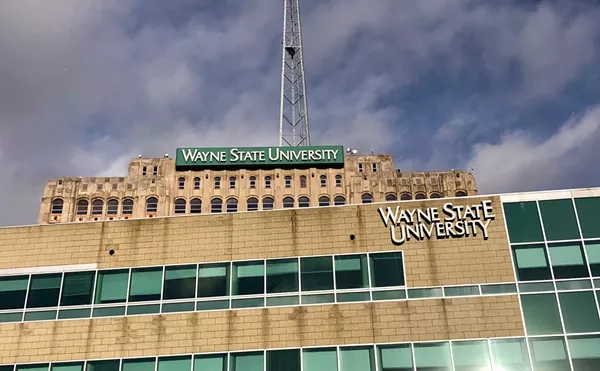
Audio By Carbonatix
[
{
"name": "GPT - Leaderboard - Inline - Content",
"component": "35519556",
"insertPoint": "5th",
"startingPoint": "3",
"requiredCountToDisplay": "3",
"maxInsertions": 100,
"adList": [
{
"adPreset": "LeaderboardInline"
}
]
}
]
Ah, Kwame Kilpatrick. Detroit’s youngest mayor is proof positive that hope springs eternal.
Despite the fact that Detroit Auditor General Joe Harris has called Kilpatrick’s proposed budget (which Harris estimates has a $300 million hole) the road to receivership; despite the loud scoffing noises from pretty much everyone, everywhere, who’s not a part of the Kilpatrick administration; and despite the Detroit City Council’s unprecedented overhaul of Kilpatrick’s proposed budget, Detroit’s mayor continues to maintain that his budget is the only viable option.
Detroit City Council voted on May 24 to adopt its heavily amended budget with what they say are more reliable revenue sources and deeper cuts. At a press conference later that day, Kilpatrick called the council’s budget "rude," "cruel" and "disingenuous," dismissed Harris as someone with "absolutely … no knowledge of the process of city government" and continued to tout the wisdom of his fiscal plan.
One of the biggest problems with Kilpatrick’s budget, critics agree, is that it’s based on several improbable — or impossible — revenue streams and cost-savings. For examples, let’s take the proposed regional takeover of Cobo Center (in theory, a $6 million savings) and the transfer of the Detroit Department of Transportation’s responsibilities to the newly created Detroit Area Regional Transportation Authority (DARTA) by Jan. 1 (in theory, a $10 million savings).
At the May 24 briefing, Kilpatrick said that negotiations about Cobo weren’t going so well.
Dead in the water might be a better description.
Oakland County Deputy Executive Bob Daddow says that, after months of waiting, officials haven’t even been able to begin evaluating a plan for Cobo.
The county recently issued a 49-page report about a Cobo takeover, based mostly on what Daddow calls "information we haven’t got."
Daddow says he’s been asking for basic information like operating costs and financial statements for 15 months. Without that kind of information, Daddow says, it’s impossible to tell whether the idea is viable.
"I don’t feel like I have much more energy for this plan," Daddow says. "We’ve said, here are all the issues we need to solve, write a report on it and we’ll evaluate it."
Macomb County Commission Chair Nancy White says, for her county, it’s even simpler: "I have taken the position that Macomb County taxpayers aren’t ready to make that kind of commitment when no one has shown us how Cobo Hall benefits this area."
Without Macomb and Oakland on board, a regional transfer of Cobo isn’t going to happen.
Kilpatrick’s sunny optimism shone forth again when it came to DARTA negotiations — they’re "moving forward," according to Hizzoner.
It all depends on how you define "moving forward." If, by "moving forward," you mean dealing with an organization that’s about two steps away from existing exclusively on paper, that’s also tied up in court for the foreseeable future, then "moving forward" is a great description of the negotiations.
DARTA has no director or budget. A Wayne County Court judge decided in favor of unions in a lawsuit challenging its ability to function as a regional transit board. The appeal is still pending, and, until that’s decided, the authority couldn’t take action, even if it had a director, funds and a plan.
Those technical details aside, the DARTA plan is also dependent on cooperation from Oakland and Macomb counties. That "R" in DARTA stands for "regional."
Daddow says he doesn’t see it happening.
Kilpatrick "can’t cut his budget and then say, ‘Hey, guys, help me out.’ It’s not the way you build your budget."
Send comments to NewsHits@metrotimes.com




